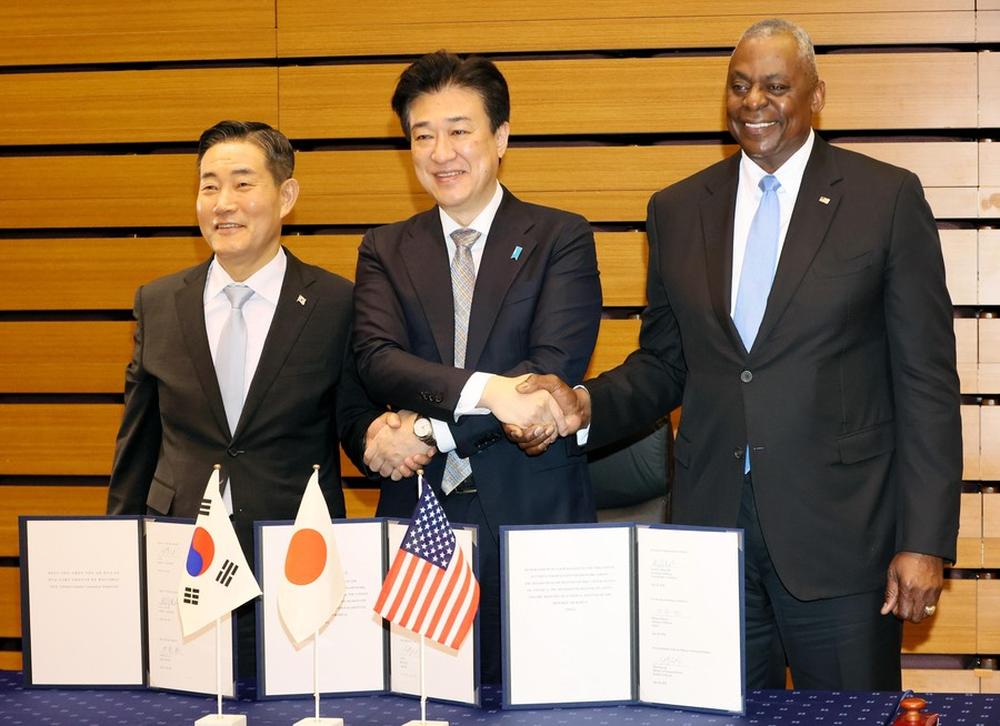
- #Japan
- #Multilateral Relations
- #South Korea
- #US-ROK Alliance

► Improved Korea-Japan Relations: The relationship between South Korea and Japan has significantly improved over the past year, driven by South Korea's resolution of the forced labor issue, increased collaboration, and the influence of new leadership in both countries.
► Trilateral Cooperation and U.S. Influence: The U.S.-ROK-Japan relationship remains a crucial framework for regional stability, though concerns about changes in U.S. and Japanese leadership could affect the dynamic. There's potential to rethink these relations beyond the traditional Cold War-era structure.
► Broader Multilateral Collaboration: Beyond bilateral relations, there is potential for expanded multilateral cooperation involving South Korea, Japan, and other nations, addressing shared challenges like security, natural disasters, and technological innovation.
The shift in the relationship between South Korea and Japan and following the resolution of the forced labor issue by the South Korean government a year ago has been noteworthy. Notwithstanding considerable resistance and discontent in South Korea, the relationship between two nations has undergone a profound improvement. In addition to a notable surge in people-to-people exchanges, the two governments have made significant headway in ongoing deliberations concerning prospective collaboration in a multitude of domains. These shifts in bilateral relations have also resulted in changes to trilateral relations with the United States. For the first time, the three countries held a trilateral summit, marking a departure from the historic ‘Camp David Spirit’. Now, a year later, with leadership changes in the United States and Japan, trilateral cooperation has entered a new phase. What will the future hold for the ROK-Japan relations and the ROK-the U.S.-Japan relations? Also, will the ROK-Japan relationship, which is perceived as a potential point of contention in the ROK-the U.S.-Japan relationship, remain stable?
The inauguration of Ishiba's cabinet on October 1 represented a significant turning point in the history of the ROK-Japan relations. South Koreans have expressed support for Ishiba Shigeru's electoral victory at the presidential election of LDP (Liberal Democratic Party), citing his forthright stance on Japan's wartime responsibilities, apologies, and historical reckoning. This is because, despite the improvement in relations between South Korea and Japan, there has been a persistent sense of frustration regarding the lack of progress on historical issues. It is uncertain how long Ishiba's cabinet will remain in power, given his low support within the LDP and the public's continued disappointment with the LDP. The outcome of the House of Representatives election on October 27 will serve as an indicator of this. Nevertheless, it is anticipated that Prime Minister Ishiba will maintain a considerable number of Kishida's policies including diplomacy, thereby ensuring the continuity of the current amicable relationship between South Korea and Japan. Moreover, former Prime Minister Kishida, who played a pivotal role in Ishiba's victory at the LDP’s presidential election, views the strengthening of South Korea-Japan relations as a notable achievement in his term. It is encouraging that he will contribute to the continuation of the current trajectory by providing support to new Prime Minister Ishiba. Furthermore, the outcome of the U.S. presidential election in November will introduce another variable. The result of the election will indubitably have an effect on the ROK-the US-Japan relations and the ROK-Japan relations. Notwithstanding the efforts of three countries to institutionalize trilateral relations and cooperation in order to guarantee their durability in the context of political transitions, concerns persist regarding the potential impact of leadership changes on the ROK-Japan relations and trilateral relations with the US. In certain instances, even the historic Camp David summit may become mere footnotes in history.
The concerns about the potential instability of Korea-Japan relations due to a change in Japanese leadership, and the impact of a change in U.S. leadership on the ROK-the U.S.-Japan relations, have positioned the U.S. at the center of the ROK-the U.S.-Japan relations, with Korea-Japan relations viewed as a subordinate element of the ROK-the U.S.-Japan relations. In other words, the two pillars of the U.S.-ROK alliance and the U.S.-Japan alliance have been the primary sources of support for the ROK-the U.S.-Japan relationship. Consequently, any instability in the ROK-Japan relationship has been perceived as a potential threat to the stability of the ROK-the U.S.-Japan relationship. But how about a shift in thinking? It would be beneficial to consider a shift in perspective. Rather than focusing on the relationship between Japan and Korea within the context of the ROK-US-Japan relations, it may be more advantageous to adopt a collaborative structure that encompasses “’the U.S-Japan’ and Korea,” “’the U.S-Korea’ and Japan,” and “’Korea-Japan’ and the U.S.”?
It is evident that, irrespective of whether South Korea and Japan are considered in terms of their relationship with the United States, there are numerous issues that are distinctive to the two countries and challenges that they collectively confront. In addition to security and economic issues in geopolitical ties, the two geographically proximate countries are also affected by natural disasters, including those resulting from climate change, such as floods, earthquakes, tsunamis, and typhoons. Furthermore, as two countries situated on the coastline, it is inevitable that maritime security, including the freedom of navigation, as well as concerns pertaining to production, energy, and the environment, will persist. Additionally, social issues such as a low birthrate, an aging population, social welfare, and a labor shortage are comparable in both countries. Moreover, collaboration in the realms of science and technology, including AI, quantum, cybersecurity, and other areas, is imperative in the current era of transformation. In the context of bilateral relations, the unresolved colonial historical issues, such as the comfort women, forced labor, history textbooks, and the Yasukuni Shrine, represent significant challenges that both countries must collectively address. In essence, there are numerous compelling reasons why South Korea and Japan should and can collaborate, even if it is not to address only the North Korean nuclear issue.
Thus, it has the potential to extend the solidarity between South Korea and the Japan beyond the bilateral relationship to encompass multilateral cooperation with the other countries. We can make a cooperation such as ’South Korea-Japan-the U.S.’, ‘South Korea-Japan-China’, ‘South Korea-Japan -Australia’, and ‘South Korea-Japan-the Association of Southeast Asian Nations (ASEAN)’. Discussions about such cooperation networks have already taken place within the Asia-Pacific Partnership (AP4), which includes Korea, Japan, Australia, and New Zealand. Additionally, a summit of democracies was convened.
While the necessity, importance, and potential of such cooperation are clear, it is nevertheless evident that the discussion of Korea-Japan relations has been largely framed in the context of ‘the ROK-the U.S-Japan’ which is formed in the Cold War-era. Nevertheless, it is imperative to adopt a new perspective. Rather than focusing on stabilizing Korea-Japan relations to strengthen the trilateral relations, it would be more beneficial to expand the scope of cooperation based on the stability of Korea-Japan relations. Next year, 2025 will mark the 60th anniversary of the normalization of diplomatic relations between South Korea and Japan. The two countries, which share the values of a democracy and market economy, can build a better future based on mutual needs.

Dr. CHOI Eunmi is a research fellow at the Asan Institute for Policy Studies. Dr. CHOI received her M.A. and Ph.D. in Political Science from Korea University. Previously, Dr. Choi was a research professor of the Center for Japanese Studies at the Institute of Foreign Affairs and National Security (IFANS) of Korea National Diplomatic Academy (KNDA), a visiting researcher at University of Michigan (USA), Waseda University (Japan) and the Sejong Institute, and a researcher at Ministry of Foreign Affairs of ROK. Her main area of research interest is Korea-Japan Relations, Japanese Diplomacy, and multilateral cooperation in Northeast Asia. Currently, Dr. Choi is a member of the advisory committee to the Ministry of Foreign Affairs, the Ministry of National Defense, and National Security Office.


